Foundations of Biblical Study Collection (16 vols.)
Digital Logos Edition
Overview
Dig into the Bible's background and message with the Foundations of Biblical Study Collection. Providing ample resources for research, teaching, and personal devotion this collection take you on comprehensive tour of Scripture, its ancient cultures, compelling personalities, and world-changing events. Featuring top scholars such as Craig Blomberg, DavidGordon Fee, Ben Witherington, and David Alan Black, this collection help you focus your study and understand Scripture more fully.

- Features top theologians
- Includes dictionaries, introductions and more
- Covers an enormous number of topics and the various perspectives on them
- Title: Foundations of Biblical Study Collection
- Volumes: 16
- Pages: 10,065
- Resource Type: Introductions, Biographies, Monographs, Reference
- Topic: Biblical Studies
- Resource ID: {35CBAB75-D986-4603-844D-1F0CDB248583}
Individual Titles
- A Student's Guide to Textual Criticism of the Bible by Paul D. Wegner
- Eerdmans Dictionary of the Bible edited by David Noel Freedman
- The Eerdmans Dictionary of Early Judaism edited by John J. Collins
- The Eerdmans Companion to the Bible edited by Gordon D. Fee, Robert L. Hubbard Jr.
- Old Testament Wisdom: An Introduction by James L. Crenshaw
- Faithful to the End: An Introduction to Hebrews through Revelation by Terry L. Wilder, J. Daryl Charles, Kendell Easley
- The Bible’s Prophets: An Introduction for Christians and Jews by David J. Zucker
- The Bible’s Writings: An Introduction for Christians and Jews by David J. Zucker
- An Introduction to the Literature of the Old Testament by S.R. Driver
- New Testament Rhetoric: An Introductory Guide to the Art of Persuasion in and of the New Testament by Ben Witherington III
- Old Testament Survey: The Message, Form, and Background of the Old Testament by William Sanford LaSor, David A. Hubbard, Frederic Bush
- Jesus and the Gospels: An Introduction and Survey, 2nd ed. by Craig L. Blomberg
- The New Testament: Its Background and Message by Thomas D. Lee, David Alan Black
- Paul and His Letters by John B. Polhill
- The Handbook of Bible Application by Neil S. Wilson
- Collins Bible Companion by Martin Manser
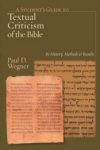
A Student's Guide to Textual Criticism of the Bible presents, in plain language and with ample illustration, an overview of the history and methods, aims and results of textual criticism. In the process, the readers gain an appreciation for the vast work that has been accomplished in preserving the text of Scripture and find a renewed confidence in its reliability.
Here, at last, is a well-written, succinctly stated, wisely selected history and wonderfully illustrated textual criticism guide that covers both testaments in one volume. Where others have often made this science sound arcane and obtuse, Paul Wegner has skillfully described textual criticism in plain but ample and interesting ways. I highly recommend it to all serious Bible students, but especially to seminary faculty who must juggle book budgets and who up to now have had to order a separate text in this area for each testament.
—Walter C. Kaiser Jr., President and Colman M. Mockler Distinguished Professor of Old Testament, Gordon-Conwell Theological Seminary
Paul D. Wegner is professor of Old Testament at Phoenix Seminary in Phoenix, Arizona. He is the author of The Journey from Texts to Translations: The Origin and Development of the Bible.
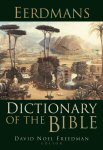
The Eerdmans Dictionary of the Bible gathers nearly 5,000 alphabetically ordered articles that thoroughly yet clearly explain all the books, persons, places, and significant terms found in the Bible. The Dictionary also explores the background of each biblical book and related writings and discusses cultural, natural, geographical, and literary phenomena—matters that Bible students at all levels may encounter in reading or discussion.
David Noel Freedman (1922–2008) received his PhD in Semitic languages and literature from Johns Hopkins University in 1948.
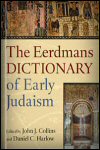
The Eerdmans Dictionary of Early Judaism is ecumenical and international in character, bringing together the contributions of a superb group of Jewish, Christian, and other scholars. With equal attention paid to literary and nonliterary (archaeological and epigraphic) evidence, this substantial volume will prove to be an invaluable resource for scholars, students, and general readers alike.
This dictionary, containing an immense amount of useful information presented with great clarity by an impressive range of scholars including many leading experts in the field, will be an essential resource for all those interested in studying the late Second Temple period and the Jewish background to the origins of Christianity
—Martin Goodman, Faculty of Oriental Studies, University of Oxford
John J. Collins is Holmes professor of Old Testament Criticism and Interpretation at Yale Divinity School and has served as president of both the Society of Biblical Literature and the Catholic Biblical Association.
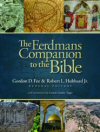
Over two hundred user-friendly maps, charts, graphics, and photos bring ancient places to life. Numerous articles offer significant insights into the Bible's people, places, and main ideas. Travelers who visit specific individual books will find in-depth, illuminating commentary based on up-to-date research. Reflecting a broad evangelical perspective, The Eerdmans Companion to the Bible continues the publisher's proud tradition of providing quality biblical resources for nearly a century. This handy guidebook promises to make the Word of God come alive as never before.
Gordon D. Fee is professor emeritus of New Testament studies at Regent College in Vancouver, British Columbia. In addition to his many highly respected commentaries and biblical studies, he is also the author of Paul, the Spirit, and the People of God; Gospel and Spirit; and How to Read the Bible for All Its Worth.
Robert L. Hubbard is professor of biblical literature at North Park Theological Seminary, Chicago, and general editor of the New International Commentary on the Old Testament series. He chaired the team of translation consultants for The Message by Eugene Peterson, and his books include the award-winning NICOT volume on the book of Ruth.
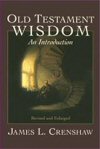
When Old Testament Wisdom first appeared in 1981, it was praised and widely adopted as a tool that equipped students of the Bible to understand the wisdom literature of the Old Testament (Job, Psalms, Proverbs, Ecclesiastes, Sirach, and Song of Solomon). At that time, new perspectives on biblical theology, an increasing awareness of ancient Near Eastern texts resembling biblical wisdom, and an emerging interest in ethnic proverbs were just the beginning of what was to become a dramatic outpouring of scholarship on wisdom literature.
In this expanded edition, James Crenshaw takes stock of the wealth of new material produced by contemporary interpreters. Liberation and feminist critics, scholars in comparative religion, specialists in devotional theology, and researchers exploring educational systems in the ancient Near East all have enriched our understanding of wisdom literature in recent years, and all receive insightful treatment in this new volume. Now as before, Crenshaw's Old Testament Wisdom is an invaluable asset for anyone wishing to understand the rich and complex legacy of wisdom literature.
James Crenshaw is one of the foremost scholars of biblical wisdom literature. He is known for the breadth of his learning, the clarity of his writing, and the good judgment he applies to ancient texts. These qualities are evident in the present revision of Old Testament Wisdom, which goes well beyond the earlier edition and encompasses a wide range of recent publications on biblical wisdom.
—Michael V. Fox, Weinstein-Bascom Professor in Jewish Studies, University of Wisconsin-Madison
Author's Name is Robert L. Flowers Professor of Old Testament at The Divinity School, Duke University. Crenshaw is one of the leading interpreters of wisdom literature and has also published widely on biblical prophecy. His Old Testament Wisdom has introduced thousands of students to biblical wisdom, who can consult his commentaries, Ecclesiastes and Sirach, plus his essays, Urgent Advice and Probing Questions, and Education in Ancient Israel, for further insights. A former editor of SBL Monograph Series, and chair of the section on wisdom literature, he currently edits Personalities of the Old Testament. He taught at Vanderbilt Divinity School for 18 years and has been at Duke for 15.
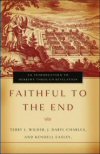
In classroom and scholarly study, the Gospels, Acts, and the Pauline letters receive far more attention than does the so-called “end” of the New Testament: Hebrews; James; 1 and 2 Peter; 1, 2, and 3 John; Jude; and Revelation. Faithful to the End: An Introduction to Hebrews Through Revelation offers a careful study of these latter biblical letters, closely examining each one’s authorship and origin, destination and audience, purpose, and major themes. Appropriate as a reference work or textbook in college and seminary classrooms, this volume uniquely combines head knowledge with a challenge to the heart, for it is purposefully titled after each book’s recurring theme of persevering in the faith. Coauthor Terry L. Wilder writes, “Our hope is that God might use this text to help readers not only learn about these New Testament books, but also to appropriate the message contained in each. May we be faithful to the end!”
Terry L. Wilder is associate professor of New Testament and Greek at Midwestern Baptist Theological Seminary in Kansas City, Missouri. He holds a Ph.D. in New Testament from the University of Aberdeen, Scotland.
J. Daryl Charles has served as the senior fellow, Center for Politics and Religion, Union University. He now serves as the director and senior fellow of the Bryan Institute for Critical Thought and Practice, Bryan College, Dayton, Tennessee.
Kendell Easley is professor of Christian Studies and program director for the Master of Christian Studies at Union University. He holds a Ph.D. in New Testament from Southwestern Baptist Theological Seminary and also wrote the Holman New Testment Commentary on Revelation.
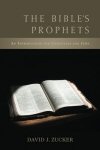
The Bible’s Prophets introduces the reader to the world of Joshua, Judges, 1 and 2 Samuel, 1 and 2 Kings, and the literary prophets: Isaiah, Jeremiah, and Ezekiel, plus the 12 “minor” prophets: Hosea, Joel, Amos, Obadiah, Jonah, Micah, Nahum, Habakkuk, Zephaniah, Haggai, Zechariah, and Malachi. These books form the second section of the Hebrew Bible—the Prophets/Neviim.
Each chapter covers one particular biblical book and is divided into an introduction with an analyses of geopolitical and historical background, and significant events, personalities, concepts, and divisions; a look at the biblical book and the Christian Scriptures; the biblical book in rabbinic literature; and finally, textual study. An excellent source for Christian, Jewish, or interfaith study of the Bible’s prophets.
This book is engagingly written and concisely surveys these biblical books, some scholarly views about them, and also Christian and rabbinic interpretations of these books. Because Christian readers are usually least familiar with the rabbinic perspectives, they may find these the most enlightening of all.
—Craig S. Keener, professor of New Testament, Asbury Theological Seminary
David J. Zucker is a rabbi and author of four previous books, including The Torah: An Introduction for Christians and Jews. Zucker publishes and lectures extensively in the areas of Bible, American Jewish literature, and chaplaincy. A popular speaker, he has made presentations in North America, Israel, and Europe.
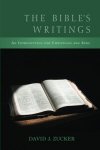
The Bible’s Writings introduces the reader to the world of Psalms, Proverbs, Job, The Song of Songs, Ruth, Lamentations, Ecclesiastes, Esther, Daniel, Ezra, Nehemiah, and 1 and 2 Chronicles. These books form the third section of the Hebrew Bible—the Writings/Ketuvim.
Each chapter covers one particular biblical book and is divided into an introduction with an analyses of geopolitical and historical background, and significant events, personalities, concepts, and divisions; a look at the biblical book and the Christian Scriptures; the biblical book in rabbinic literature; and finally, textual study. An excellent source for Christian, Jewish, or interfaith study of the Bible’s prophets.
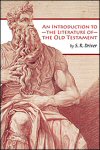
The aim of An Introduction to the Literature of the Old Testament is to furnish an account, at once descriptive and historical, of the literature of the Old Testament. This includes an account of the contents and structure of the several books together with a description of their general character and purpose. This book is a powerful tool in the study, appreciation, and application of the message and material found in the Hebrew Scriptures.
S.R. Driver (1846-1914), born in England, was a Hebrew scholar and professor, as well as a writer of numerous theological resources including commentaries on Genesis, Leviticus, Jeremiah, and Job.
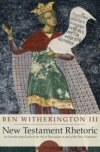
This much-needed introduction to the ancient art of persuasion as it is used in the New Testament doesn’t only explore the use of rhetorical tools and devices, it introduces everything ancient speakers and writers used to convince their audiences. New Testament scholar Ben Witherington argues that rhetorical criticism is a more fruitful approach to the New Testament epistles than literary and discourse criticism. He guides readers through the varied uses of rhetoric throughout the New Testament, showing them how writers used rhetorical tools to convince their readers and listeners of the Christian message.
Anyone who is interested in the contours of early Christian discourse or would like to be able to preach and teach as persuasively as the biblical authors will find this volume highly informative and immensely helpful.
—Michael Bird, tutor in New Testament, Highland Theological College
Ben Witherington is one of the top evangelical scholars in the world, and is an elected member of the prestigious Studiorum Novi Testamenti Societas (SNTS), a society dedicated to New Testament studies. He is the Amos Professor of New Testament for Doctoral Studies at Asbury Theological Seminary, and on the doctoral faculty at St. Andrews University in Scotland.
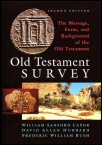
Since its initial publication in 1982, Old Testament Survey has served as the standard textbook on the background, content, literary quality, and message of the Old Testament. The second edition of this excellent work has been thoroughly revised and updated to take into account new research in the field of Old Testament studies. The book now also includes important new contributions from six leading biblical studies scholars: Leslie C. Allen, James R. Battenfield, John E. Hartley, Robert L. Hubbard, Jr., John E. McKenna, and William B. Nelson, Jr.
William Sanford LaSor (1911–1991) was professor emeritus of Old Testament at Fuller Theological Seminary in Pasadena, California.
David Allan Hubbard (1928–1996) was president emeritus and professor emeritus of Old Testament at Fuller Theological Seminary.
Frederic William Bush is the D. Wilson Moore Professor Emeritus of Ancient Near Eastern Studies at Fuller Theological Seminary.
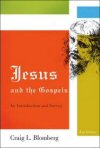
This second edition of Jesus and the Gospels prepares readers for an intensive study of Matthew, Mark, Luke, John, and the events they narrate. Craig Blomberg considers the historical context of the Gospels and sheds light on the confusing interpretations brought forth over the last two centuries. This updated version, factoring in new scholarship, debate, critical methods, and the ongoing quest of the historical Jesus, ensures that the work will remain a top tool for exploring the life of Christ through the first four books of the New Testament.
Nothing of significance that has appeared in the last dozen years seems to have been missed by Craig Blomberg and his assistants in this careful updating of his well-received survey text on Jesus and the Gospels in order to fit it for a fresh generation of students. This is a rich resource from which even the seasoned scholar can pick up valuable material.
—I. Howard Marshall, honorary research professor of New Testament, University of Aberdeen
Craig L. Blomberg (PhD, University of Aberdeen) is a distinguished professor of New Testament at Denver Seminary, where he has taught for more than 15 years.
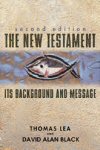
The influential The New Testament: Its Background and Message provides an excellent, broad-stroke overview of the New Testament, introducing the types of literature found in the New Testament and exploring their background—political, cultural, historical, and religious.
In this comprehensive volume, Thomas Lea presents a clear and concise introduction to the New Testament, giving readers the key to understanding these important texts. The work also focuses on specific New Testament books such as the Gospels, Acts, and Paul and his letters. Written in an easy-to-understand style and form, Lea’s text unlocks the message of the New Testament for both new students and seasoned scholars.
David Alan Black has revised this classic introduction to the New Testament in this second edition, which includes improved sections on the text of the New Testament and the synoptic problem, up-to-date book outlines reflecting an awareness of recent work on the discourse structure of some of the New Testament books, and updated bibliographies.
David Alan Black, a well-known and highly regarded New Testament scholar, is professor of New Testament and Greek at Southeastern Baptist Theological Seminary in Wake Forest, NC.
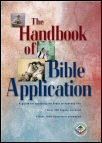
The Handbook of Bible Application arranges application materials from the Life Application Study Bible and the Life Application Bible Commentary series into easy-to-find topics. This gives the user a clear understanding of the relevance of Bible readings. Alphabetically listed, over 450 topics are discussed in light of scriptural truth.
Neil Wilson holds a master's degree from Trinity Evangelical Divinity School and has served as pastor of Eureka United Methodist Church in Wisconsin for thirteen years. He has contributed to dozens of devotional works, including the Life Application Study Bible and the Life Application Bible Commentary series.
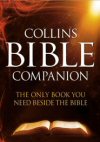
The new Collins Bible Companion is the complete guide for anyone who wants to read, understand or follow the teachings of the Bible. Its clear structure and contents, combined with an attractive, full color design, make it the most accessible Bible guide on the market as well as the most complete.
Martin H. Manser is a professional reference-book editor and Bible scholar who has compiled and edited more than seventy titles, including dictionaries and biblical reference works. He holds the BA Honors degree in linguistics and an MPhil degree, and he resides with his wife and children in England.